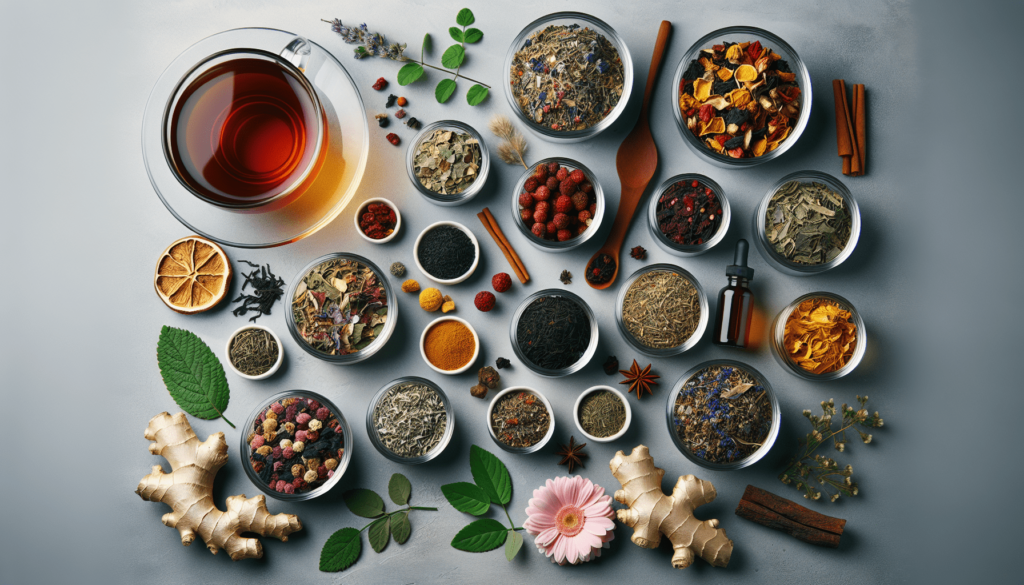Looking for some natural relief from reflux symptoms? Look no further than herbal teas. Whether you’re dealing with acid reflux, heartburn, or GERD, incorporating certain herbal teas into your daily routine can help soothe those uncomfortable symptoms. From chamomile to ginger to marshmallow root, we’ve got a list of 10 herbal teas that are known for their soothing properties when it comes to reflux. So grab your favorite mug and get ready to find your new go-to tea for calming that pesky acid.
1. Chamomile Tea
Chamomile tea is not only soothing and comforting to drink, but it also offers a range of benefits for those experiencing acid reflux symptoms. One of its key advantages is reducing inflammation in the digestive tract, which can help to alleviate discomfort and irritation caused by acid reflux. Additionally, chamomile tea promotes relaxation and better sleep, which can be beneficial for individuals with acid reflux. By improving sleep quality, chamomile tea indirectly supports the management of acid reflux symptoms. Furthermore, chamomile tea helps soothe the lining of the esophagus, providing relief from the burning sensation associated with acid reflux.
2. Peppermint Tea
Peppermint tea is a well-known natural remedy for various digestive issues, including indigestion and heartburn. Its ability to relax the muscles in the gastrointestinal tract can help alleviate the symptoms of acid reflux. When the muscles relax, it becomes easier for food and stomach acid to move through the digestive system, reducing the likelihood of acid reflux occurring. Peppermint tea also aids in digestion and may help prevent acid reflux from happening in the first place. However, individuals with gastroesophageal reflux disease (GERD) should exercise caution when consuming peppermint tea, as it can trigger symptoms in some cases.

3. Licorice Root Tea
Licorice root tea is a herbal tea that has been used for centuries to soothe irritation of the digestive system. It contains compounds that support healthy digestion and reduce acid reflux symptoms. Licorice root tea can also potentially aid in healing damaged esophageal tissue caused by acid reflux. However, it’s important to note that licorice root tea should be consumed in moderation, as excessive intake can have negative effects such as increased blood pressure. It is advisable to consult with a healthcare professional before incorporating licorice root tea into your diet, especially if you have any underlying medical conditions.
4. Ginger Tea
Ginger tea is a popular herbal remedy for a variety of digestive issues, including acid reflux. It aids digestion and can provide relief from acid reflux symptoms such as heartburn and indigestion. The anti-inflammatory properties of ginger also help reduce inflammation in the esophagus, reducing the discomfort caused by acid reflux. Additionally, ginger tea helps soothe the lining of the stomach, promoting overall digestive health. It’s worth noting that while ginger tea can be beneficial for managing acid reflux symptoms, excessive consumption should be avoided as it may lead to heartburn in some individuals.

5. Marshmallow Root Tea
Marshmallow root tea is known for its ability to form a protective barrier in the throat and esophagus, which can help reduce acid reflux symptoms and throat irritation. The mucilaginous properties of marshmallow root create a soothing effect on the mucous membranes in the digestive tract, providing relief from the discomfort associated with acid reflux. This herbal tea can also help reduce inflammation in the digestive system, further alleviating acid reflux symptoms. However, individuals with diabetes should consume marshmallow root tea in moderation, as it may affect blood sugar levels.
6. Slippery Elm Tea
Slippery elm tea is another herbal remedy known for its soothing properties on the throat and digestive tract. It coats and soothes the throat, providing relief from the discomfort caused by acid reflux. Slippery elm tea also reduces inflammation and discomfort caused by acid reflux, making it an effective natural option for managing symptoms. Furthermore, it may assist in healing damaged esophageal tissues commonly associated with chronic acid reflux. As with any herbal tea, it is important to consult with a healthcare professional, particularly if you are on medication, before incorporating slippery elm tea into your routine.
7. Fennel Tea
Fennel, a herbaceous plant with aromatic seeds, has long been used as a natural remedy for various digestive ailments, including acid reflux. Fennel tea is known to relieve symptoms such as heartburn and indigestion. It acts as a carminative, helping to reduce bloating and gas in the digestive system. Fennel tea also supports healthy digestion by soothing the stomach and promoting the movement of food through the digestive tract. While fennel tea can be beneficial for managing acid reflux symptoms, it should be consumed in moderation to avoid any adverse effects.
8. Dandelion Root Tea
Dandelion root tea, renowned for its detoxifying properties, can also promote healthy digestion and reduce acid reflux symptoms. It acts as a gentle diuretic, aiding in the elimination of toxins from the body, which indirectly supports overall gastrointestinal health. Additionally, dandelion root tea can help reduce acid reflux by promoting healthy digestion and supporting liver function. However, individuals with certain medical conditions, such as gallbladder issues or allergies to dandelions, should exercise caution and consult with a healthcare professional before consuming dandelion root tea.
9. Lemon Balm Tea
Lemon balm, a member of the mint family, offers numerous health benefits, including its ability to reduce stress and promote relaxation. By reducing stress levels, lemon balm tea may help ease acid reflux symptoms, as stress can exacerbate digestive disorders. Lemon balm tea also relieves indigestion and soothes the stomach, providing relief from acid reflux-related discomfort. It is worth noting that lemon balm tea may interact with certain medications, so it is important to consult with a healthcare professional before incorporating it into your routine.
10. Aloe Vera Tea
Aloe vera, a succulent plant with numerous healing properties, can also be consumed as a tea to soothe and heal the digestive tract. Aloe vera tea is commonly used to reduce inflammation and irritation caused by acid reflux. Its cooling and soothing properties help alleviate symptoms such as heartburn and indigestion. Aloe vera tea also supports overall gastrointestinal health, promoting proper digestion and reducing the occurrence of acid reflux. However, it is important to ensure that the aloe vera used for tea consumption is specifically formulated for internal use, as some varieties meant for topical use may not be safe for ingestion.
Incorporating herbal teas into your routine can be a natural and soothing way to manage acid reflux symptoms. However, it is crucial to remember that individual experiences may vary, and what works for one person may not work for another. It is always advisable to consult with a healthcare professional before adding any new herbal tea or supplement to your diet, especially if you have underlying medical conditions or are currently taking medication. With proper guidance and moderation, these herbal teas can be a valuable addition to your acid reflux management strategy.





